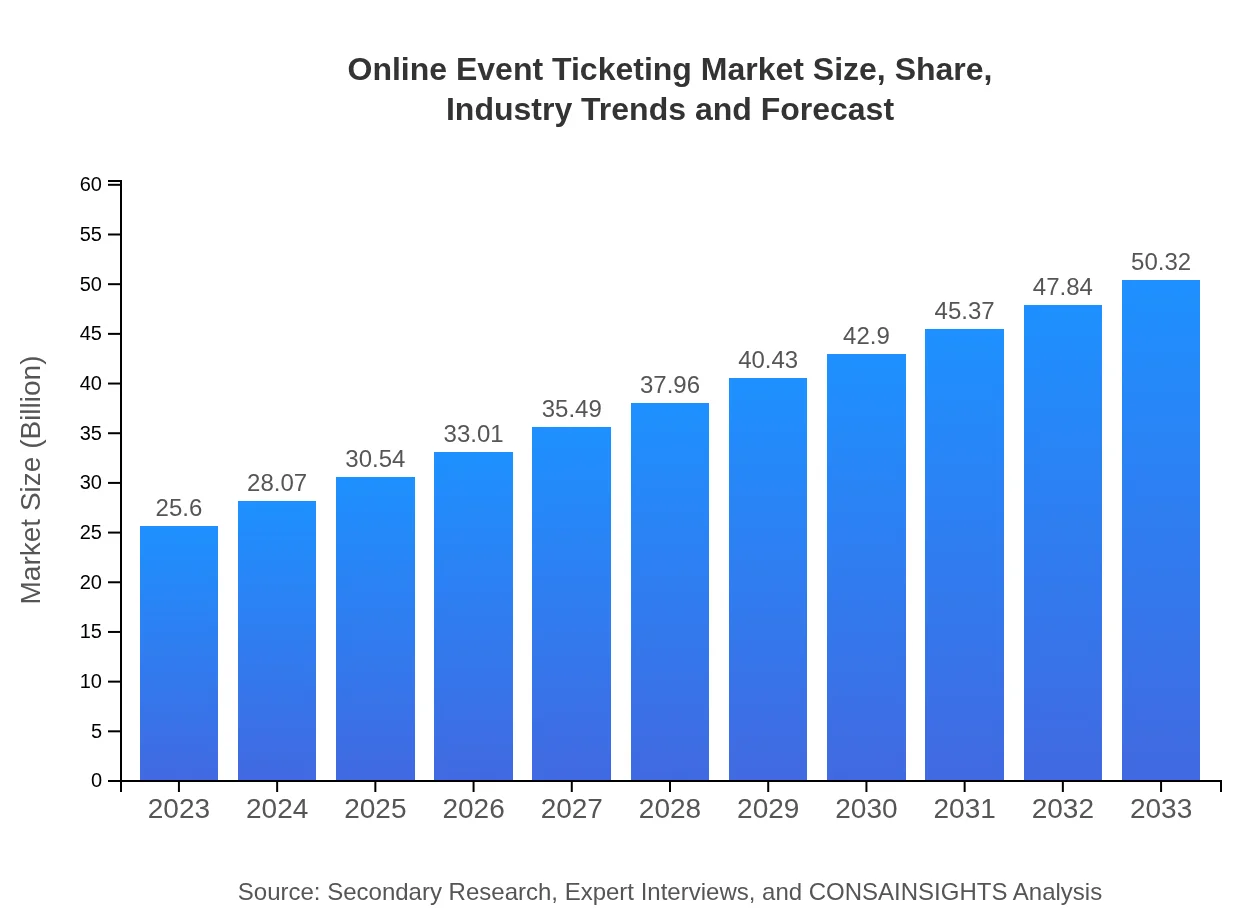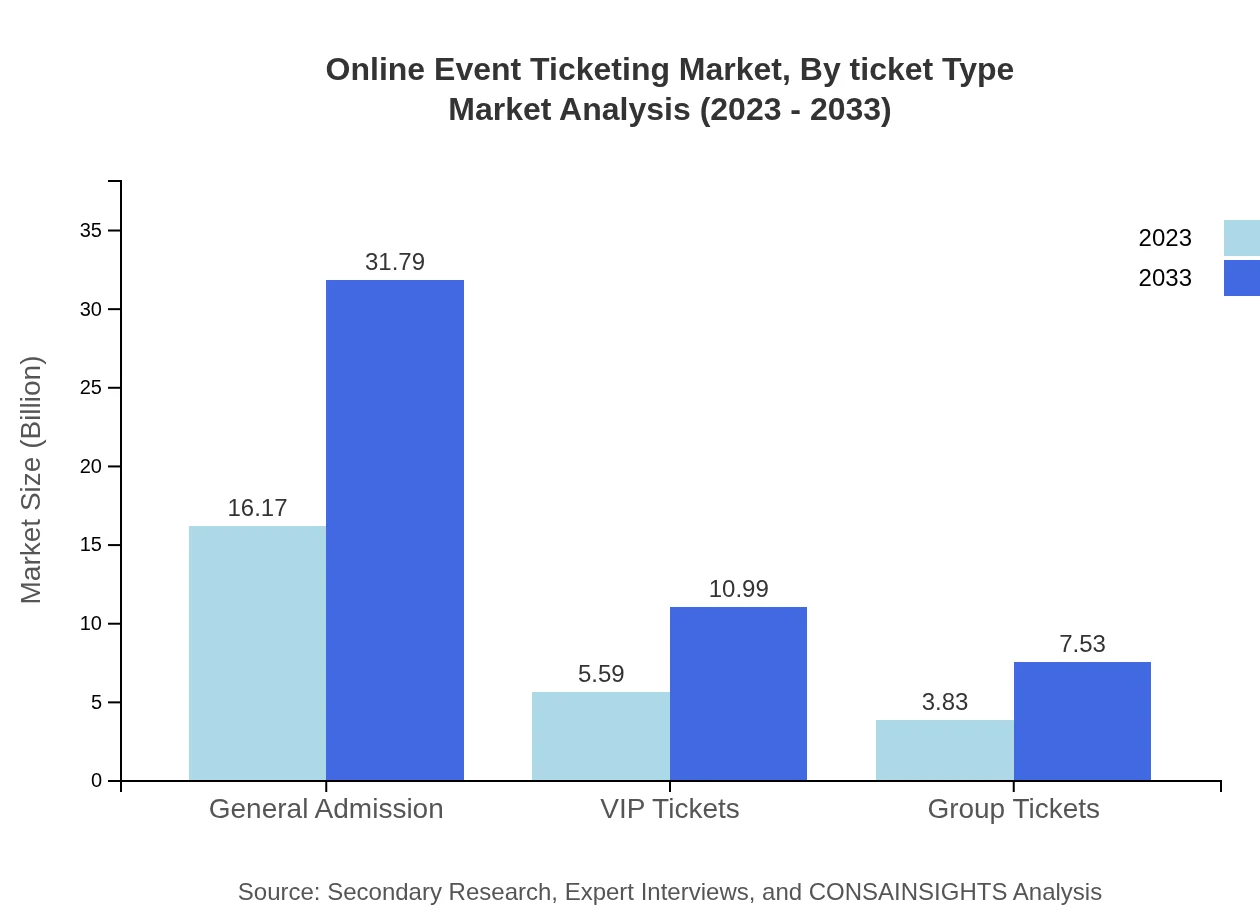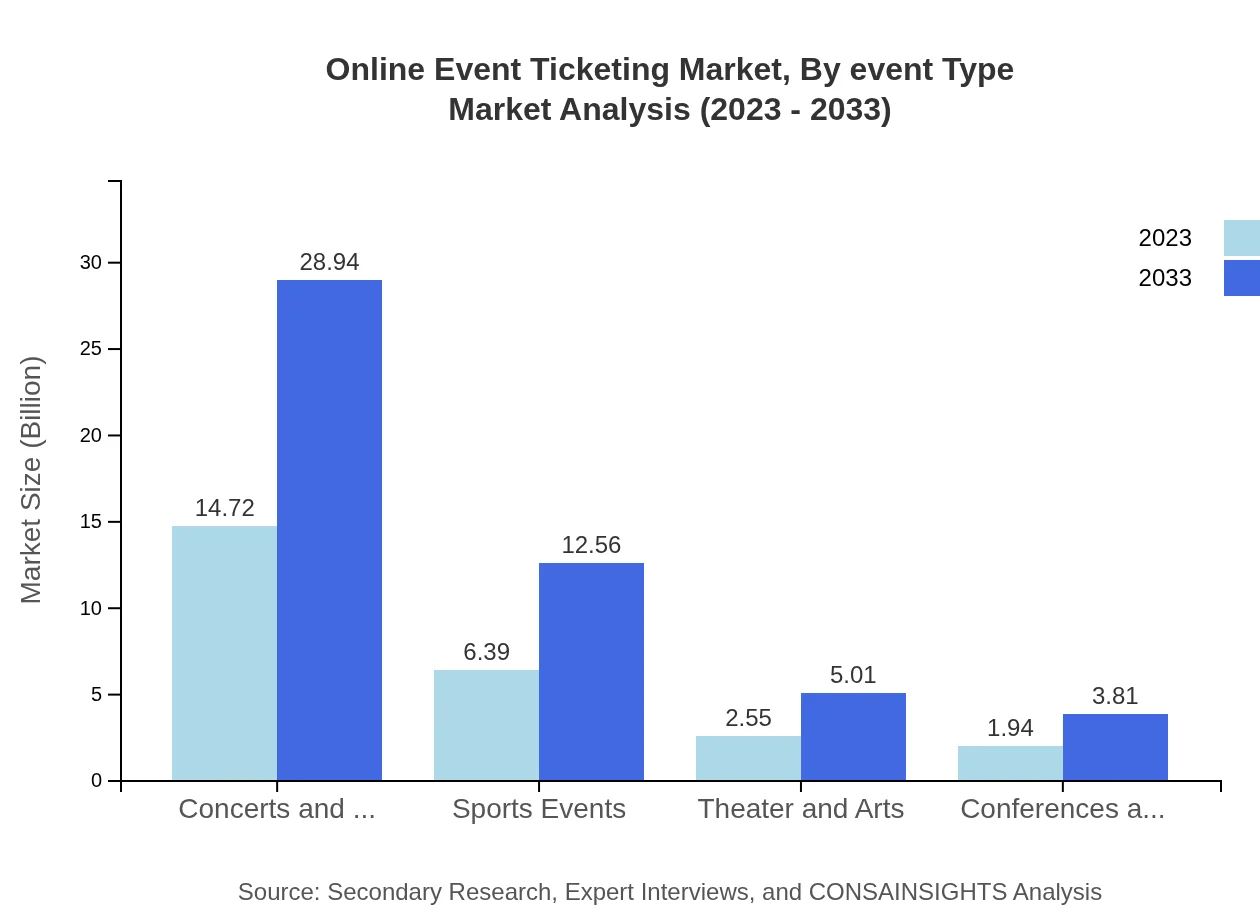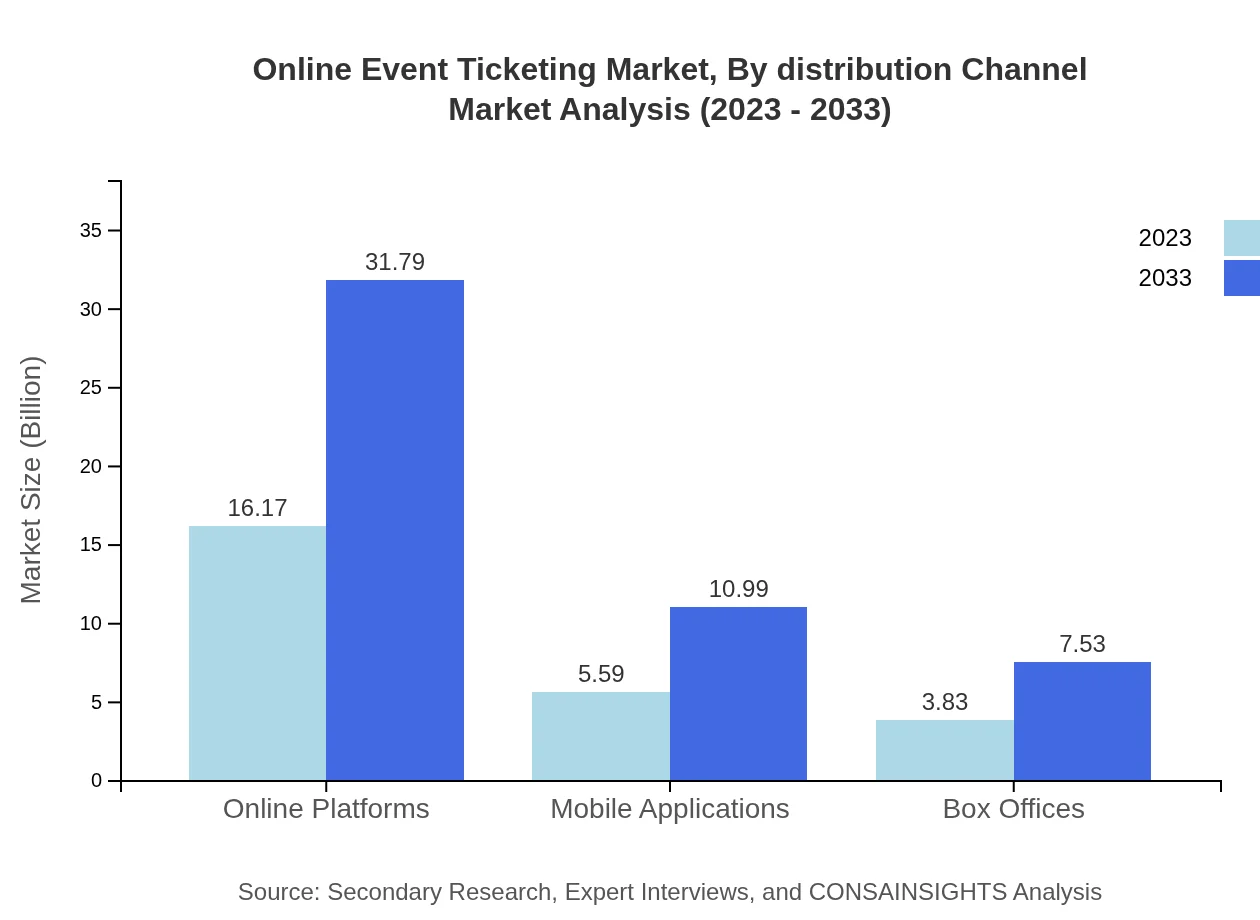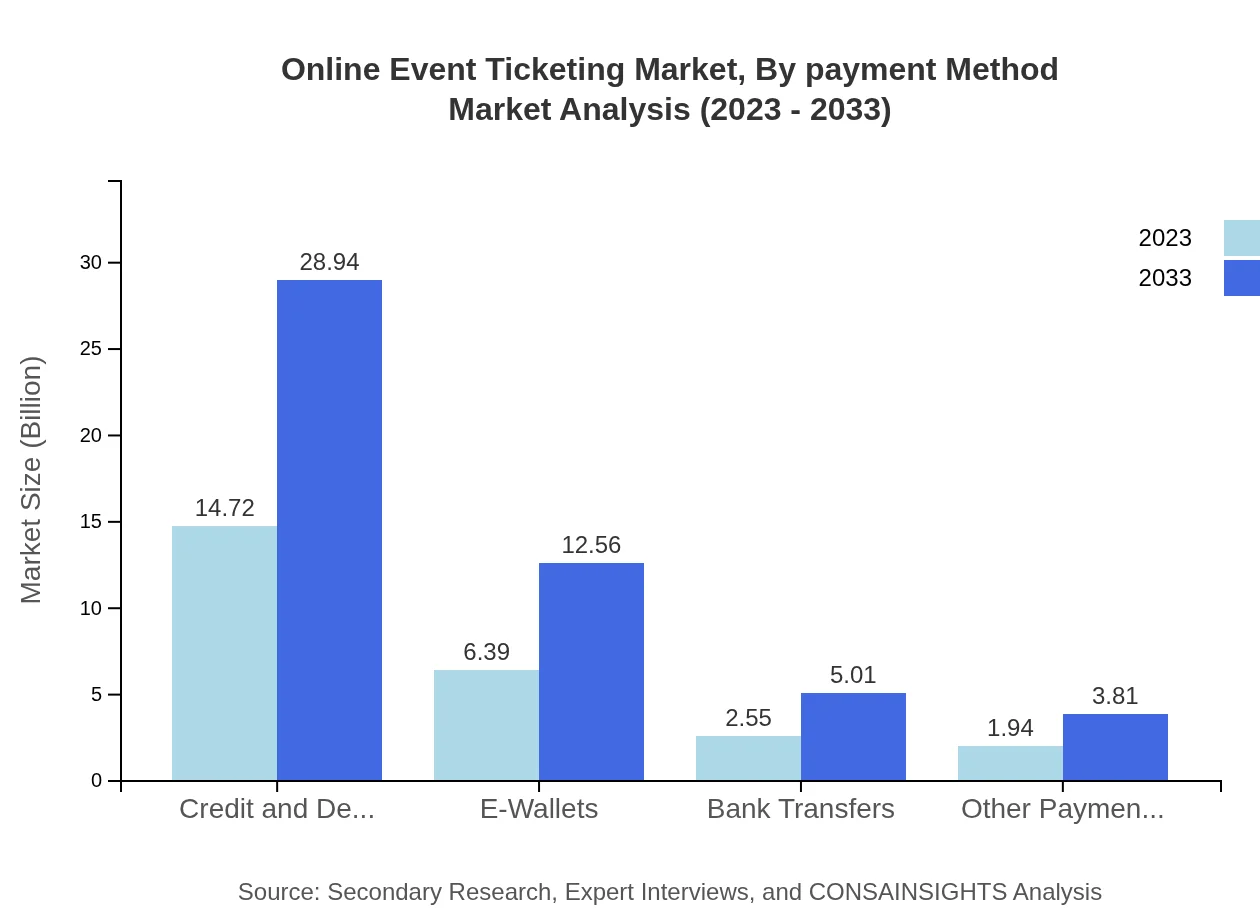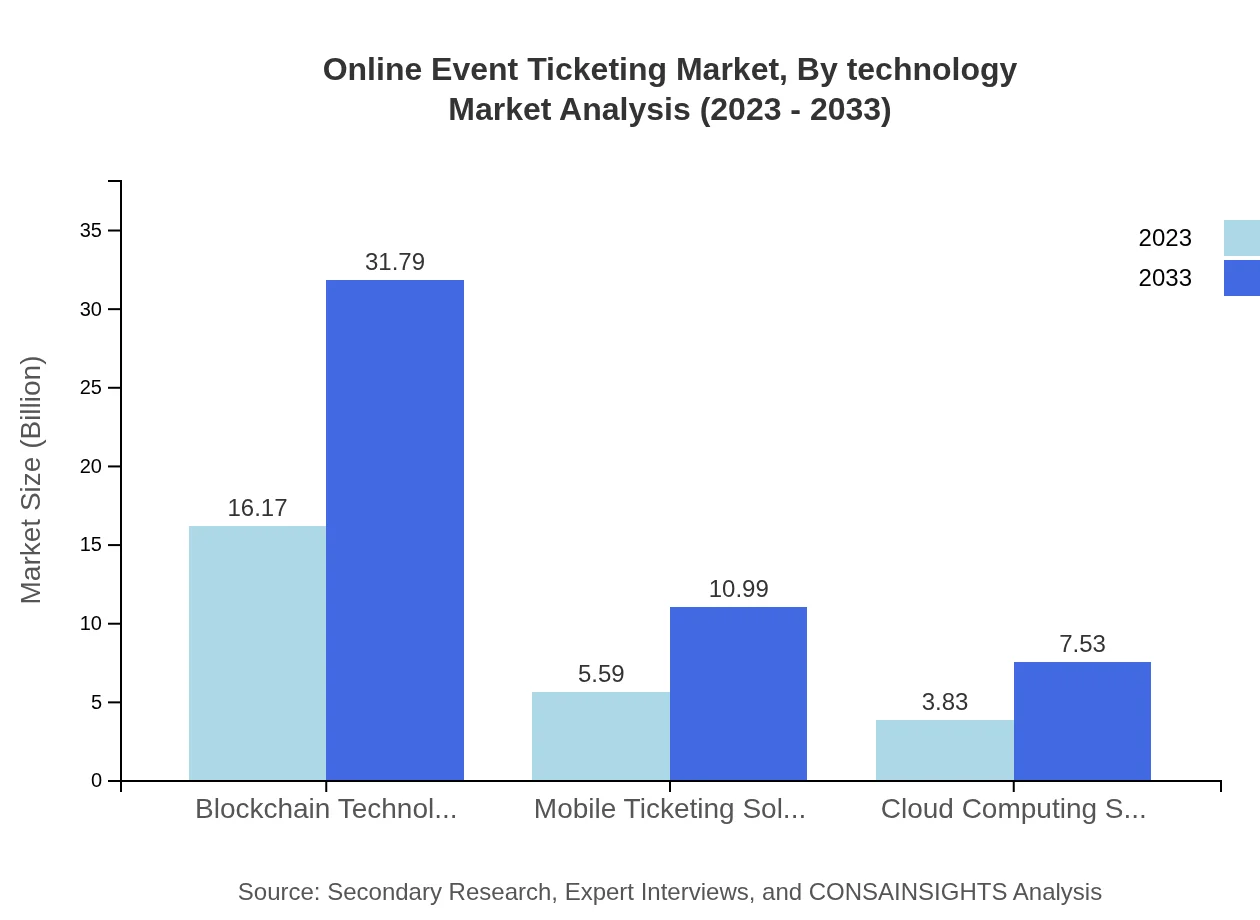Online Event Ticketing Market Report
Published Date: 31 January 2026 | Report Code: online-event-ticketing
Online Event Ticketing Market Size, Share, Industry Trends and Forecast to 2033
This report explores the Online Event Ticketing market, providing comprehensive insights into market dynamics, size, trends, and forecasts from 2023 to 2033, offering valuable information for stakeholders to understand growth opportunities and challenges.
| Metric | Value |
|---|---|
| Study Period | 2023 - 2033 |
| 2023 Market Size | $25.60 Billion |
| CAGR (2023-2033) | 6.8% |
| 2033 Market Size | $50.32 Billion |
| Top Companies | Ticketmaster, Eventbrite, Vivendi, See Tickets |
| Last Modified Date | 31 January 2026 |
Online Event Ticketing Market Overview
Customize Online Event Ticketing Market Report market research report
- ✔ Get in-depth analysis of Online Event Ticketing market size, growth, and forecasts.
- ✔ Understand Online Event Ticketing's regional dynamics and industry-specific trends.
- ✔ Identify potential applications, end-user demand, and growth segments in Online Event Ticketing
What is the Market Size & CAGR of Online Event Ticketing market in 2033?
Online Event Ticketing Industry Analysis
Online Event Ticketing Market Segmentation and Scope
Tell us your focus area and get a customized research report.
Online Event Ticketing Market Analysis Report by Region
Europe Online Event Ticketing Market Report:
Europe's market is expected to grow from $7.24 billion in 2023 to $14.22 billion by 2033. Major markets in the UK, Germany, and France are benefiting from high attendance at live events and evolving consumer preferences for online ticket purchases.Asia Pacific Online Event Ticketing Market Report:
The Asia Pacific region is increasingly becoming a hub for online event ticketing, forecasted to grow from $5.44 billion in 2023 to $10.69 billion by 2033. This growth is spurred by rising disposable incomes and an expanding middle-class population, increasing the demand for entertainment experiences.North America Online Event Ticketing Market Report:
North America remains the largest market for online event ticketing, with a projected growth from $8.37 billion in 2023 to $16.44 billion in 2033. The region's advanced technological infrastructure and high internet penetration contribute significantly to this growth.South America Online Event Ticketing Market Report:
In South America, the market is set to expand from $2.32 billion in 2023 to $4.55 billion by 2033. Brazil and Argentina are leading this growth, facilitated by improved internet connectivity and the rising popularity of live events among the youth.Middle East & Africa Online Event Ticketing Market Report:
The Middle East and Africa region's market is projected to increase from $2.24 billion in 2023 to $4.41 billion by 2033. Factors such as increased urbanization and interest in international events are driving demand in this region.Tell us your focus area and get a customized research report.
Online Event Ticketing Market Analysis By Ticket Type
In the Online Event Ticketing market, the ticket type segmentation indicates that General Admission and VIP Tickets dominate this category. General Admission is projected to grow significantly, increasing from $16.17 billion in 2023 to $31.79 billion by 2033, accounting for approximately 63.18% market share. VIP Tickets also hold a significant position, growing from $5.59 billion to $10.99 billion in the same forecast period.
Online Event Ticketing Market Analysis By Event Type
Concerts and Festivals remain the largest segment, with market size projected to grow from $14.72 billion in 2023 to $28.94 billion by 2033, maintaining a market share of 57.51%. Sports Events and Theater and Arts segments also show growth, with Sports Events expected to reach $12.56 billion by 2033.
Online Event Ticketing Market Analysis By Distribution Channel
Distribution channels are categorized into Online Platforms, Mobile Applications, and Box Offices. Online Platforms hold the largest share, projected to climb from $16.17 billion to $31.79 billion by 2033, signifying 63.18% of the market. Mobile Applications, too, are gaining traction with increasing smartphone usage.
Online Event Ticketing Market Analysis By Payment Method
The payment method segmentation highlights that Credit/Debit Cards continue to dominate the market, projected to hold $14.72 billion in 2023 and grow to $28.94 billion by 2033. E-Wallets are also gaining popularity, expanding from $6.39 billion to $12.56 billion in the same period.
Online Event Ticketing Market Analysis By Technology
Technological advancements play a key role in shaping the Online Event Ticketing landscape. Blockchain technology, mobile ticketing solutions, and cloud computing solutions are predominant. The market for blockchain technology alone is expected to expand from $16.17 billion to $31.79 billion by 2033, demonstrating a rising interest in securing ticket transactions.
Online Event Ticketing Market Trends and Future Forecast
Tell us your focus area and get a customized research report.
Global Market Leaders and Top Companies in Online Event Ticketing Industry
Ticketmaster:
Ticketmaster is a leading global ticketing platform known for providing access to a wide range of events. They utilize advanced technology to enhance customer experiences and streamline the ticket purchasing process.Eventbrite:
Eventbrite is a popular online ticketing platform that enables users to create, promote, and sell tickets for various events. They leverage data analytics to optimize event promotion and ticket sales.Vivendi:
Vivendi operates through various subsidiaries associated with event ticketing and entertainment, strengthening its position in the global market by promoting live experiences.See Tickets:
See Tickets specializes in ticket sales for events across numerous sectors and is recognized for their commitment to innovative solutions and customer service.We're grateful to work with incredible clients.









FAQs
What is the market size of online event ticketing?
The global online event ticketing market is valued at approximately $25.6 billion in 2023, with a projected compound annual growth rate (CAGR) of 6.8%, indicating strong growth and expansion over the upcoming years.
What are the key market players or companies in the online event ticketing industry?
Key players in the online event ticketing industry include Ticketmaster, Eventbrite, Live Nation, AXS, and See Tickets. These companies dominate the market through advanced technology, customer services, and extensive event partnerships.
What are the primary factors driving the growth in the online event ticketing industry?
The growth of the online event ticketing industry is primarily driven by increasing online ticket sales, technology adoption, enhanced user experience, a rise in live events, and the growing popularity of mobile ticketing solutions.
Which region is the fastest Growing in the online event ticketing?
The fastest-growing region in the online event ticketing market is North America, expected to grow from $8.37 billion in 2023 to $16.44 billion by 2033, driven by high disposable income and technological innovation.
Does ConsaInsights provide customized market report data for the online event ticketing industry?
Yes, ConsaInsights offers customized market report data specifically for the online event ticketing industry, catering to unique business needs, regional analysis, and detailed segmentation to help clients make informed decisions.
What deliverables can I expect from this online event ticketing market research project?
Deliverables from the online event ticketing market research project include a comprehensive report with market analysis, growth forecasts, competitor insights, and segment breakdowns, providing valuable information for strategy formulation.
What are the market trends of online event ticketing?
Significant trends in the online event ticketing market include increased mobile ticketing adoption, blockchain technology integration, a surge in virtual events, and an emphasis on data analytics to enhance customer engagement.

